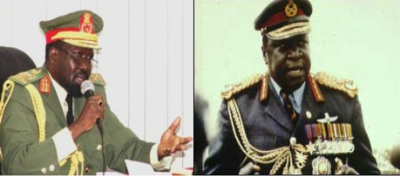 By Laraka Machar Turoal
By Laraka Machar Turoal
May 11, 2014 (SSNA) — Not too long ago when the sisterly State of Uganda experienced one of worse dictator of all times on its driving seat as President. If not because Amin got the shoe from an educated wise Ugandan whose ambition was to establish vibrant Uganda, the today existence of Uganda would have been threatened by his ill-planted motives of nepotism, corruption and curse of static development. South Sudan has been under the same human character for 9 good years with all evils transplanted and corruption in public institutions the order of the day, nepotism the only activity in public institutions, tribalism the identity for satisfactory jobs and finally gender status the determinant of progress at work.
It may sound cynical and strong, but truth pays and heals than rosy pictures full of lies and procrastination. When Salva Kiir started to enter the web of lies in the circle of SPLM leadership and at the Presidential seat of the nation of South Sudan, he (Salva Kiir) in the beginning started to learn characters of former dictators in the spectrum of African leadership. He was rocked and dominated by stigma of a traditional leader, a trend of 18-19th centuries of African medieval kings and chiefs who use to have separate specialties’ from their peers. An African leader would decide ill-fated ideas and no one can correct them. Their position does not tolerate critics in some parts, if someone with in the kingdom/chiefdom opposes, it is taken as an insult and disrespect for the leader of which results to heavy punishment on that particular peer in question. In some cruel Kingdoms, such person would face unquestionable death penalty for inappropriate behaviors toward the King/Chief. However, some communities in South Sudan still holds strong African way of governance such as Dinka and Shiluk. A chief in Dinka remains untouchable and uneasy person to toy with when it comes to local matters while Nuer and Zande have it in different ways; they prefer democratic and participatory traditional means to handle matters of the community. When a Zande king turns despotic, he is therefore left alone without subjects to rule. A typical example of Zande is understood in 2010 Sudan General Elections when the sitting SPLM Governor (Nunu Kumba) was unseated by crde Bakasaro despite her being the SPLM State Chairperson. Similar trend was experienced in Unity State-Bentiu when SPLM Political Bureau dropped Joseph Manytuil the State Chairperson of SPLM for Crde Taban Deng who was then voted out in the SPLM State Chairmanship. Despite the effort by SPLM Political Bureau Crde Taban Deng had tough time to win the 2010 Unity State governorial contest with Jany Teny, an event which sparked-off political instability in the State.
This proves beyond reasonable doubt that Salva Kiir has long been reflecting his own static culture in handling national matters. Salva Kiir appears more of a Dinka tribesman than a President! Amin had a similar tendency actually he wanted to build a long serving-government, rule by decrees and most important of all was ex-military officers to run the entire administration up to district levels. One good thing from Amin was that he never appeared more of a Kakwa than the much stressed Ugandan identity. When Amin was overthrow, another military junta came in with the same characters like the one of Amin. Obote reinstated and life goes on in pursue of people-centered government until NRM came in with its popular 10 Points Program. Though NRM has not lived up to expectations of people of Uganda, there have never been clear ethnic lines at public and private offices all these years like it is in South Sudan. The identity of Uganda has not changed up to date. Even though its leader Yoweri K. Museveni tried to meddle on South Sudanese issues by advising its leader in a provocative manner, he still maintains Ugandan identity at home.
Salva Kiir’s and his ill-conceived ideology to discipline a whole tribe and get rid of his political opponents has opened a door of exit for him. It is real that Salva cannot rule South Sudan anymore even if he tries very much to off-load the blame from himself to Dr. Riek Machar Teny for needing to succeed him as President. Good enough, the TCSS (Transitional Constitution of South Sudan) allows any individual citizens to vote and be voted in any political office if meets the pre-conditions of a candidate.
The author can be reached at [email protected].

